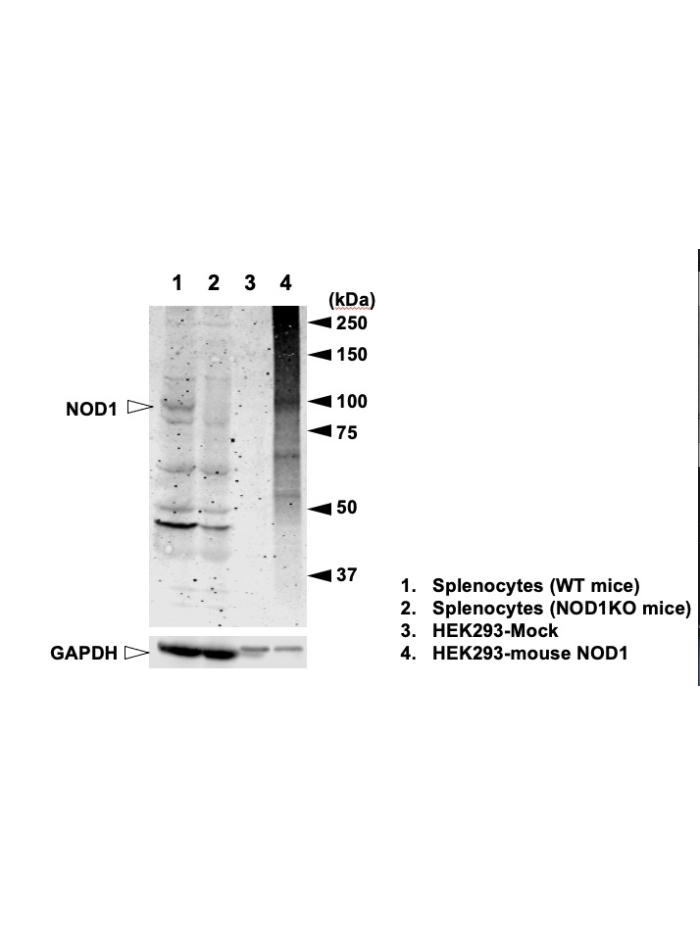NOD1 (G7) rabbit mAb
Human nucleotide-binding oligomerization domain containing protein (NOD) 1 belongs to the NOD-like receptor family, which consists of pattern recognition receptors (PRRs) that reside in the cytoplasm of cells (1,2). NOD1 is ubiquitously expressed and recognizes bacterial peptidoglycan fragments, including d-glutamyl-meso-diaminopimelic acid found in gram-negative and some gram-positive bacteria (1-3). NOD1 contains three domains: a N-terminal caspase recruitment domain responsible for mediating downstream inflammatory signaling cascades, a nucleotide binding domain necessary for receptor oligomerization and activation, and a leucine-rich C-terminal region that recognizes conserved microbial patterns and ligands (1, 3). Upon interaction with its ligands, NOD1 undergoes self-oligomerization to acquire an active conformation that elicits downstream signaling of proinflammatory and stress pathways (4,5). The adaptor protein receptor-interacting protein kinase-2 (RIPK2) then associates with the caspase recruitment domain motif of NOD1 and subsequently recruits the kinase TAK1 as a prerequisite to activate nuclear factor κB (NF-κB) and MAPK signaling (4-7). The NF-κB and MAPK cascades integrate signaling by NOD1, NOD2, and other innate immune complexes such as TLRs and various inflammasomes to vary the intensity, duration, and pattern of the downstream outcomes. NOD1 signaling can potentiate or be additive to that of TLR4 (8,9).
| Applications | WB |
|---|---|
| Clone | NOD1-G7 |
| Format | Unconjugated |
| Validated Reactivity | Mouse |
| Cross Reactivity | Predicted to work with mouse, rat and other homologues. |
| Detection | Anti-Rabbit IgG |
| Clonality | Monoclonal |
| Immunogen | Synthetic peptide |
| Formulation | 1X PBS, 0.09% NaN3, 0.2% BSA |
| Isotype | Rabbit IgGk |
| Preparation | Protein A |
| Recommended Usage | For flow cytometric staining, the suggested use of this reagent is 5 µL per million cells or 5 µL per 100 µL of staining volume. It is recommended that the reagent be titrated for optimal performance for each application. See product image legends for additional information. |
| Storage | 2-8ºC |
| Pseudonyms | Human nucleotide-binding oligomerization domain containing protein (NOD) 1 |
| Uniprot ID | Q9Y239 |
| References | 1. Correa RG, et al., 2012, Biosci Rep, 32:597–608. 2. Moreira LO, and Zamboni DS. 2012, Front Immunol, 3:328. 3. Mogensen TH. 2009, Clin Microbiol Rev, 22:240–273. 4. Caruso R, et al., 2014, Immunity. 2014, 41:898–908. 5. Strober W, et al., 2006, Nat Rev Immunol, 6:9–20. 6. Kobayashi K, et al., 2002, Nature, 416:194–199. 7. Nembrini C, et al., 2009, J Biol Chem, 284:19183–19188. 8. Tang D, et al., 2012, Immunol Rev, 249:158–175. 9. Chan KL, et al., 2017, Cell Reports, 18:2415–2426. |

